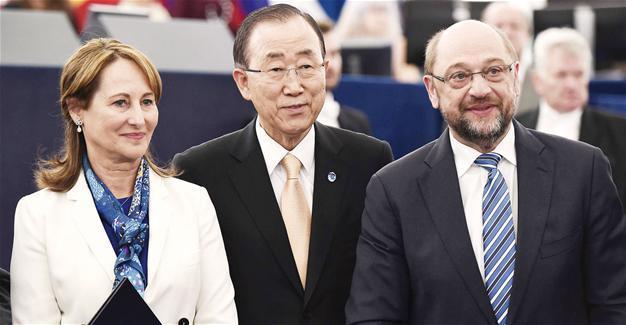Paris climate deal to enter force after EU green light
STRASBOURG – Agence France-Presse

AFP Photo
The landmark Paris climate pact was poised to enter into force globally this week after the European Parliament joined the world’s top polluters in endorsing the deal to slow the planet’s dangerous temperature rise.
In a vote watched by U.N. Secretary General Ban Ki-moon, the parliament voted overwhelmingly by 610 for, 38 against and 31 abstentions in favor of the EU’s fast-track ratification of the deal sealed in Paris last December.
That puts the European Union on track to hand over its ratification to the United Nations on Oct. 7, which would then take the international community above the threshold needed for implementation.
“I’m extremely honored to be able to witness this historic moment,” Ban said after making a special trip to the imposing European Parliament building in Strasbourg, France to watch the vote.
“I look forward to the Paris agreement entering into force as soon as possible, even in just a few days time.”
The Paris accord requires all countries to devise plans to achieve the goal of keeping the rise in temperatures within two degrees Celsius (3.6 Fahrenheit) above pre-industrial levels and strive for 1.5 C (2.7 F) if possible.
The European Parliament, the bloc’s only elected body, backed a decision by EU environment ministers last week to fast-track approval of the deal, despite only seven out of 28 EU countries having themselves ratified it.
Fears that China and the United States, the world’s two biggest polluters, were leaving Europe behind on ratifying last year’s historic deal pushed them into rushing through the ratification.
To come into force the accord needs ratification from 55 countries, which must together account for at least 55 percent of the planet’s greenhouse gas emissions, which are responsible for climate change.
With a decision in the last few days by India, the third biggest emitter, a total of 62 countries have ratified the agreement to commit to take action to stem the planet’s rising temperatures.
They all account for 52 percent of the planet’s greenhouse gas emissions, and EU ratification will bring it over 55 percent threshold by including the seven EU countries who have already approved it.
The seven EU countries - Austria, France, Germany, Hungary, Malta, Portugal and Slovakia - account for some five percent of global emissions.
The entire bloc accounts for 12 percent of global emissions.
In normal times, for such major international agreements, the EU and its 28 member states must deposit simultaneously their ratification documents under sometimes time-consuming procedures.
However, the member states overcame differences to reach a political agreement last week to bypass the usual process.
Europe has prided itself on taking a global lead on climate change issues but has watched with alarm as the rest of the world has left it behind.
“Europe today is demonstrating it’s capable of great things when it puts its energy and forces together,” European Commission chief Jean-Claude Juncker said in Strasbourg at a time when the EU is buffeted by crises from migration to Brexit.
